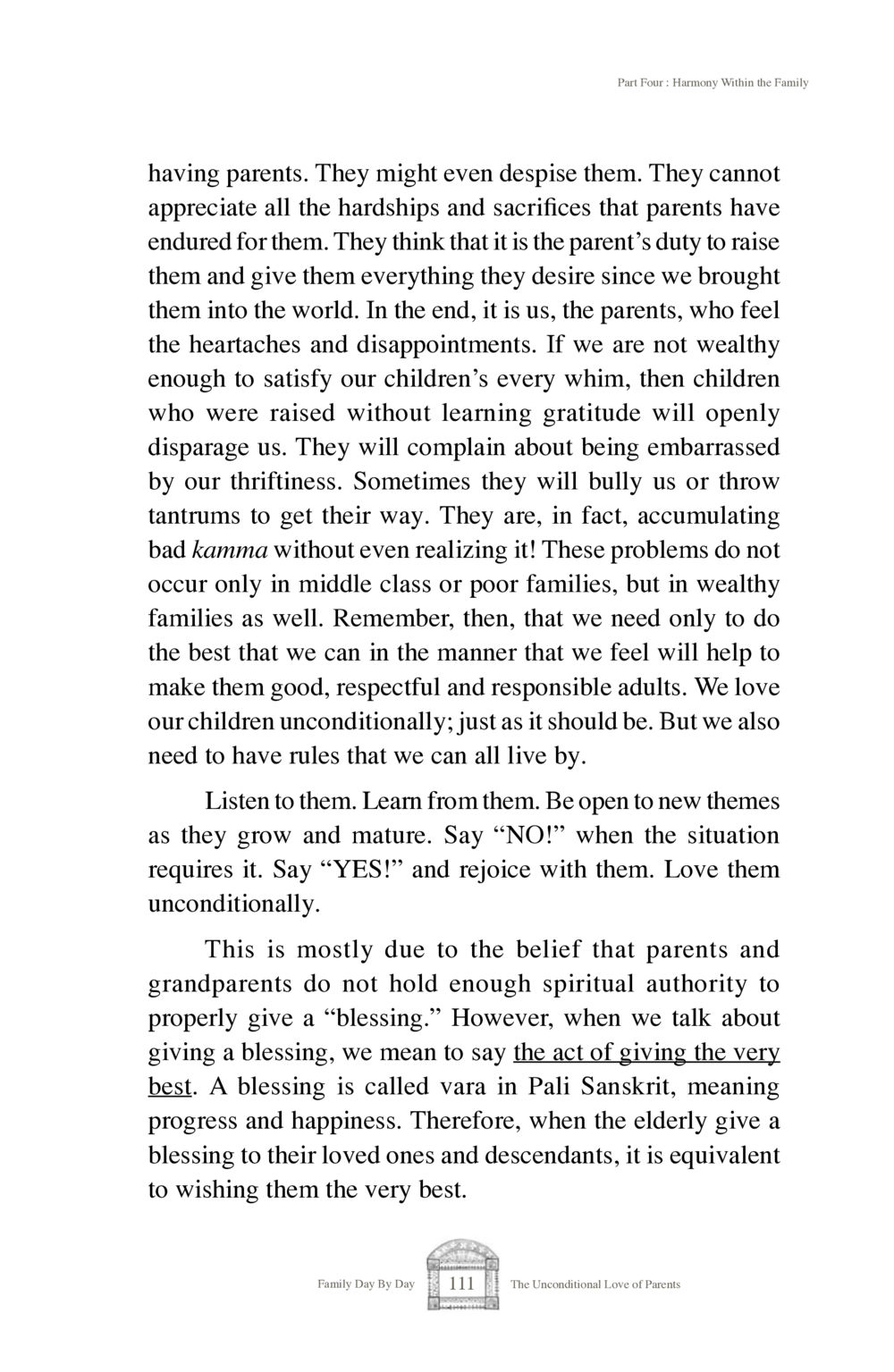Harmony Within the Family : หน้า 113/216
Family Day By Day : หน้า 113/216 Understanding the dynamics of parental love and children's gratitude to foster better family relationships.
0 ครั้ง

สรุปเนื้อหา
ในบทนี้กล่าวถึงความสัมพันธ์ระหว่างพ่อแม่และเด็ก และวิธีที่ผู้ปกครองสามารถสอนลูกให้มีความรับผิดชอบและเคารพผู้ใหญ่ ความรักที่ไม่มีเงื่อนไขเป็นสิ่งสำคัญในการเลี้ยงดู แต่กฎระเบียบยังจำเป็นต้องมีเพื่อสร้างความเข้าใจที่ดีในครอบครัว เด็กควรเรียนรู้ความกตัญญูและไม่มองว่าพ่อแม่เป็นเพียงผู้ทำหน้าที่ให้ ความรักแบบไม่มีเงื่อนไขจำเป็นต้องมาควบคู่กับการสอน และการให้พรจากผู้สูงอายุมีความสำคัญสำหรับความเจริญและความสุขของครอบครัว dmc.tv
หัวข้อประเด็น
-ความรักของพ่อแม่
-การเลี้ยงดูเด็ก
-ความกตัญญู
-การให้พร
-ความสัมพันธ์ในครอบครัว
ข้อความต้นฉบับในหน้า
Part Four: Harmony Within the Family
having parents. They might even despise them. They cannot
appreciate all the hardships and sacrifices that parents have
endured for them. They think that it is the parent's duty to raise
them and give them everything they desire since we brought
them into the world. In the end, it is us, the parents, who feel
the heartaches and disappointments. If we are not wealthy
enough to satisfy our children's every whim, then children
who were raised without learning gratitude will openly
disparage us. They will complain about being embarrassed
by our thriftiness. Sometimes they will bully us or throw
tantrums to get their way. They are, in fact, accumulating
bad kamma without even realizing it! These problems do not
occur only in middle class or poor families, but in wealthy
families as well. Remember, then, that we need only to do
the best that we can in the manner that we feel will help to
make them good, respectful and responsible adults. We love
our children unconditionally; just as it should be. But we also
need to have rules that we can all live by.
Listen to them. Learn from them. Be open to new themes
as they grow and mature. Say "NO!" when the situation
requires it. Say "YES!" and rejoice with them. Love them
unconditionally.
This is mostly due to the belief that parents and
grandparents do not hold enough spiritual authority to
properly give a "blessing." However, when we talk about
giving a blessing, we mean to say the act of giving the very
best. A blessing is called vara in Pali Sanskrit, meaning
progress and happiness. Therefore, when the elderly give a
blessing to their loved ones and descendants, it is equivalent
to wishing them the very best.
Family Day By Day 111
The Unconditional Love of Parents
หน้าหนังสือทั้งหมด

1

2

3

4

5

6

7

8

9

10

11

12

13

14

15

16

17

18

19

20

21

22

23

24

25

26

27

28

29

30

31

32

33

34

35

36

37

38

39

40

41

42

43

44

45

46

47

48

49

50

51

52

53

54

55

56

57

58

59

60

61

62

63

64

65

66

67

68

69

70

71

72

73

74

75

76

77

78

79

80

81

82

83

84

85

86

87

88

89

90

91

92

93

94

95

96

97

98

99

100

101

102

103

104

105

106

107

108

109

110

111

112

113

114

115

116

117

118

119

120

121

122

123

124

125

126

127

128

129

130

131

132

133

134

135

136

137

138

139

140

141

142

143

144

145

146

147

148

149

150

151

152

153

154

155

156

157

158

159

160

161

162

163

164

165

166

167

168

169

170

171

172

173

174

175

176

177

178

179

180

181

182

183

184

185

186

187

188

189

190

191

192

193

194

195

196

197

198

199

200

201

202

203

204

205

206

207

208

209

210

211

212

213

214

215

216
หนังสือที่เกี่ยวข้อง
Load More
